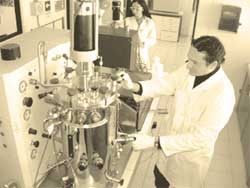Probiotics,
the era of medicine
 In Chile, feminine genital tract
infections are highly prevalent,
especially bacterial vaginosis, a
disorder that close to half the
female population suffers and
one that has strong repercussions
in their reproductive and mental
health. In Chile, feminine genital tract
infections are highly prevalent,
especially bacterial vaginosis, a
disorder that close to half the
female population suffers and
one that has strong repercussions
in their reproductive and mental
health.
Numerous studies have verified
the relation between these
diseases and the depopulation of
Lactobacillus spp. in the vaginal
ecosystem. This microorganism
protects the vaginal ecosystem
from the invasion of pathogens.
The deterioration in the quality
of life of the female population
(and the society in general), the
raised economic cost that these
place on the private and public
sector, and the strong
epidemiological impact motivated
the execution of the Fondef
project Biotechnological
development and applications for
the elaboration of a vaginal
probiotic: a alternative for the
prevention and treatment of
female genital tract infections,
which seeks to improve the
quality of life for women by
improvements in their
reproductive health.
For this, a pharmaceutical product
based in probiotic organisms will
be designed to restore the vaginal
microorganisms and prevent
infection. The principal scientific– technological impact will be the
development of an experimental
biotechnological application
model, transferable to other
disciplines for medicine as well
as agriculture, animal raising,
and food sectors.
The initiative proposes to prevent
the depopulation of the vaginal
organisms through a preparation
with lactobacilli that possess
beneficial properties such as the
production of hydrogen peroxide
and/or the capacity to adhere to
the cells of this anatomical site,
which favors the repopulation of
these beneficial bacteria.
The idea is to isolate and
characterize the best lactobacilli,
which will later be provided for
public use in a pharmaceutical
support.
The project will use a bioreactor,
a fermenting machine in which
the bacteria are cultivated,
increasing their performance and
properties. An innovative aspect
is that semi-permeable
membranes will be incorporated
to increase lactobacilli
concentration and permits the
replacement of expensive
standard culture medium with
other less-expensive ones.
Once the production of lactobacilli
is optimized, concentration
studies of the product will be
carried out to later dehydrate it
while maintaining its beneficial
properties. This process is directly
related with pharmaceutical
support and with its useful life,
and consequently its quality needs
to be assured.
Presently, the research team has
selected 10 lactobacilli with both
probiotic and biotechnological
properties, and with which they
will begin to design the
pharmaceutical presentations.
Better production
and more quality
The lactobacilli are not only
beneficial for humans, but for all
living beings in general. Their
properties, optimized by
biotechnological processes, could
also protect other species like
salmonoids.
With the identification of the
sources of Lactobacillus spp. in
the gastrointestinal tract of the
rainbow trout, a technological
business venture sketched during
the Fondef project began to
appear. Indeed, the impact of
the discovery and projections in
the national aquiculture industry
that Bio Bio region’s Technological
Innovation Fund Innova Bío Bío,
decided to finance the proposal
Biotechnological Applications for
the design of probiotics that favor
biological control in aquiculture.
The initiative seeks to provide
the conditions for clean
production and biological control
of aquiculture in the Bio Bio region
through the development of
probiotic products that prevent
infections in salmonoids,
increasing in this way their
productivity and competitiveness
in national and international
markets.
Chile has experimented an
explosive growth in the
production of salmon and trout
in the 1990s. Actually, more
than 300 thousand tons of
salmonoids are produced
nationally and the production
should be tripled in 2010,
challenging the industry,
especially in the area of
environmentally sustainable
production, not only for the
necessity to satisfy the
environmental norms, but in
evident savings that investing in
technologies that make more
efficient the utilization of food
and less use of antibiotics and
disinfectants.
This probiotic will permit the
cultivation of more health fish,
diminishing the treatments costs
of sickness and the contamination
produced by the substance for
their control. Its reach is
immense, since international
tendencies are targeted towards
clean production processes that
reduce the residue and emission
generation, utilize more
adequately the available
resources and improve production
quality. |

